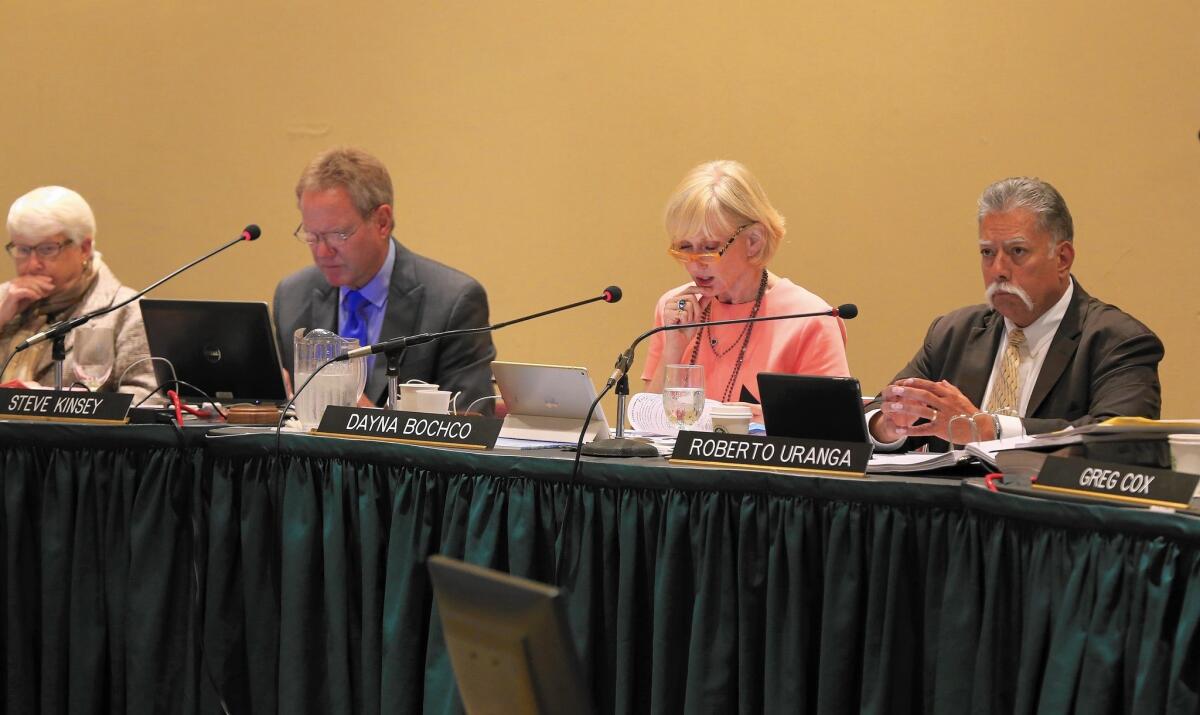Gov. Brown ‘had no plans’ to intervene, his aide said before coastal panel’s vote to fire Charles Lester

- Share via
Two members of the California Coastal Commission met with Gov. Jerry Brown’s top advisor nearly two weeks before the panel voted to fire its executive director and were told the governor did not plan to intervene, the chairman of the commission said Saturday.
Coastal Commission Chairman Steve Kinsey said by email that he and Vice Chairwoman Dayna Bochco — who ultimately voted against firing the agency’s top administrator — were told by the governor’s executive secretary, Nancy McFadden, that Brown had no plans to influence the upcoming decision.
All four of Brown’s appointees to the 12-member panel later voted to dismiss Executive Director Charles Lester from the powerful land-use agency.
In the 40-minute meeting with McFadden on Jan. 28, Kinsey and Bochco asked if Brown would try to sway commissioners before their votes Wednesday resulted in the first ouster of an executive director in the commission’s four-decade history.
McFadden “explicitly stated that the governor had not engaged in the matter up to the time we were meeting, and he had no plans to involve himself in what he considered to be the commission’s decision,” Kinsey said.
He said McFadden also noted that “the governor always retains his ability to express his views, if he wishes to do so.”
Through a spokeswoman, McFadden said Kinsey had characterized the meeting accurately and it was the only time she had met with the commission leaders on the matter.
Echoing previous comments, Brown spokeswoman Deborah Hoffman said Saturday that “this was a personnel matter involving an independent commission that was initiated and decided without any involvement from our office.”
Hoffman did not answer questions about whether the governor’s office had had contact with other members of the commission on the subject of Lester’s future.
More than 200 people spoke in support of Lester an at all-day hearing before the 7-5 vote Wednesday, joining elected officials from coastal cities and counties as well as federal and state officeholders who had written the commission urging it not to go through with the firing.
The agency, overseen by a panel of political appointees charged with upholding the 1976 Coastal Act, has broad authority over development, public beach access and natural resources along California’s 1,100-mile shoreline. The commission and its staff have long clashed with developers, local governments and property owners over the constraints it places on some of the most valuable real estate in the nation.
Governor appointees Erik Howell, Martha McClure, Wendy Mitchell and Effie Turnbull-Sanders joined Commissioners Olga Diaz, Roberto Uranga and Mark Vargas in voting to fire Lester. Voting no were Bochco, Kinsey, Carole Groom, Mary Luévano and Mary Shallenberger.
Unlike the eight other voting members on the panel, who are appointed to fixed terms by legislative leaders, governor appointees serve at will and can be dismissed at any time.
Kinsey, a Marin County supervisor who has served on the commission since 2011, said he requested the meeting with the governor’s office in mid-January after Lester chose to exercise his right to a public hearing on his possible removal.
Kinsey said his purpose was to prepare for the decision and “to hear from the source whether the governor intended to actively influence the commission’s upcoming consideration of Dr. Lester’s dismissal.”
Critics of Lester’s ouster contend it was a power grab by development-friendly commissioners. They say it sends a powerful signal to agency staff to be more accommodating to project applicants.
Some commissioners have vigorously denied that Lester’s removal reflects a desire for more coastal development and have criticized such reports as baseless and damaging to the reputation of the agency.
“We’re not trying to pave over the coast,” Brown appointee Turnbull-Sanders said at a public hearing Wednesday before she voted to dismiss Lester.
Although members of the panel have not offered specifics, they have alluded to management, trust and communication problems with Lester and his staff that had built up over years. Several commissioners have complained of problems getting information from agency staff and being left in the dark about how staff members had come to their recommendations on projects.
Some commissioners have criticized what they say is insufficient diversity on the staff and a planning and approval process that is too long and burdensome for developers.
Environmentalists, coastal residents and others opposed to Lester’s firing have greeted commissioners’ explanations with skepticism and have continued to demand answers about why commissioners voted the way they did.
In an interview the day after his dismissal, Lester echoed his supporters’ concerns, saying there had been a shift on the commission to be more receptive to the concerns of developers and exert greater control over agency staff. Lester said he suspected he was fired for being too independent and worried that his removal might mark a “fundamental shift in direction” for the coastal watchdog agency.
Twitter: @tonybarboza
Times staff writer John Myers contributed to this report.
ALSO
‘I’m a nice guy’: O.C. jail escapee asserts innocence in jailhouse interview
Effort to seal the formerly leaking well near Porter Ranch makes progress
Can Inglewood’s NFL-fueled turnaround be a success if its schools are failing?
More to Read
Sign up for Essential California
The most important California stories and recommendations in your inbox every morning.
You may occasionally receive promotional content from the Los Angeles Times.








